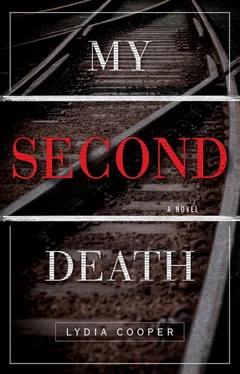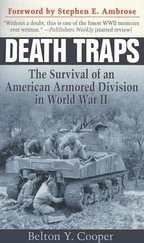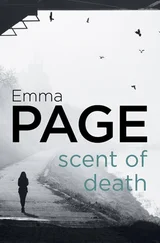Dad makes a noise, half-cough, half-cry, and turns his head to the side. Mom sits still. Her eyes glisten but the tissue rests in her lap and she is no longer sniffling.
“Shit.” I lean my head back. The glass is cold. “This is so pointless.”
“Would it do any good to ask why you didn’t tell anyone.” This from my father, the dean, who, one supposes, has become accustomed to stating truths and not asking questions and so unconsciously flattens his interrogatives into declaratives.
I shrug. “It wasn’t a problem.” And raise my voice as the dean opens his mouth to protest. “Come on. I know you’re going to bitch and moan about how it’s abuse or whatever but it’s fucking not . Okay? I don’t care. I never cared.”
Across the room the little boy swivels his thumb in his mouth, staring at me with wide, white-rimmed blue eyes.
I narrow my eyes and point my finger at him. “The word is fuck. F-u-c-k. You look over here again I’m going to go over and jab your eyes out with that fucking G.I. Joe, you little Aryan asswipe. Got it?”
He puts his thumb in his mouth and scuttles behind a planter.
“Oh, yes, why don’t you deflect the conversation with a few more violent and repugnant remarks,” my father says. “What do you think? Do you think we can come up with something grotesquely hilarious to describe what it feels like to find out your son has been abusing your daughter for twenty years and no one mentioned a goddamn fucking thing?”
“Jesus Christ,” I say. “I’m fine. He ’s the one in the fucking coma.”
“Mickey, stop it.”
Every head in the waiting room swivels. Aidan stands in the doorway with a bag of Doritos. Stephen is behind him.
Aidan comes into the room. He rips open the bag of chips and sits down. My parents blink like cats, slowly, with the skin around their eyelids as if their faces are imperfect masks. Stephen slides into his seat next to mom.
Aidan says, “You don’t have to do that.” In the sallow fluorescent lighting his skin looks mottled like cottage cheese, the sacs under his eyes sallow bruises. He turns to my parents. “She’s good ,” he says. As if there is something weighty and sweet in the word.
“Oh God,” I say. “Just shut up. Please.”
My father grunts in negation but seems unable to find articulate sounds. His eyes wander the scuffs in the floor, the gouges and rubber streaks.
My mother sighs. The sound is like a leaf falling.
Aidan looks at me, lifts the bag of chips. “Want one?”
“Shit,” I say. I push off the window and go over and sit next to him, lean forward, elbows propped on my knees. My head feels so heavy. I rub my palms over my forehead.
My father clears his throat. When he speaks his voice is soft, almost invisible. “I apologize for losing my temper. Can you at least — can you just tell us why you lied? Did you — did you think we wouldn’t believe you?”
“I didn’t say anything because, for the millionth time, it wasn’t a big deal. It wasn’t . It was just games. Just — games. And I knew if anyone found out they’d make this huge fucking deal out of it.”
I get up. My muscles feel twitchy. I want to run. I go over to the window again.
Aidan says, “You get it, don’t you? I know it’s hard to hear, but you should know. She has problems, yeah, she may even have that antisocial thing. But the rest of it, the cutting, that’s not — it’s not her fault. It’s not .”
I spin around.
My father’s head is raised, his eyes unseeing but fixed on Aidan. I don’t like the way my father is looking at him. I hit my palms against my thighs and rock on the balls of my feet. My skin crawls. I feel like when I was on the anti-anxiety meds. I want to smash my face into the corner of the metal window frame.
“Not my fault? I mutilate dead bodies. Even if it’s not my fault it’s pretty fucking dire. You’re, you can’t just say words like that.”
“You can if they’re true.”
“Oh come on. You sound like you ate a barrel full of clichés and then drank a quart of laxative.”
They all stare at me.
I hunch my shoulders. “Look, what does it matter? None of this changes anything. Do you think I wouldn’t change if I could? Oh, God, you don’t deserve this, him or me, you really don’t. Okay? Dad? No one deserves this.”
Dad says, “But—”
“She lied because she loves him,” Aidan says loudly. In the sudden quiet he clears his throat. “Sorry,” he says. “I thought it was obvious.”
I run out of the room.
David John Brandis dies at 3:58 P.M. without regaining consciousness. His death is ruled a suicide.
The obituary lists calling hours on Wednesday, December 28 at Westminster Presbyterian Church in Akron, Ohio.
The newspaper does not list the burning of a 1971 Chevrolet Chevelle, nor does it describe the snow-caked ghost yard near Firestone Park where the fire-scorched carapace is towed the morning of Tuesday, December 27.
The funeral is held Saturday at noon. New Year’s Eve. The phone rings all morning and falls silent at 11:49.
The house creaks and murmurs to itself in the absence of human voices. I sit on the mattress in my parents’ garage. I pick a hangnail on my thumb. Watch a tiny seed of blood emerge. I blot the blood on the yellow blanket beside me. Then I clasp my hands together between my knees.
The reception is held at the house. I listen to the cars pull up, the voices and clatters in the kitchen as caterers light butane-fueled warming pans and set out silverware.
Someone knocks on the garage door. I consider answering or getting up but my muscles feel sluggish. My throat hurts.
The door creaks open.
“Honey? Are you going to come in and get something to eat?”
My mother stands framed by a sugar-white cap of snow on the carport roof. The sky flames with dying light behind her, bronze and vermillion.
“No.”
“All right.” She stands in the open doorway. Her boysenberry lipstick has bled into the fine cracks around her lips. “Are you okay?”
Cold air snakes around my ankles. “Yes.”
“Do you want to come inside?”
I open my mouth to say that the answer should be patently obvious. She is holding the edge of the door so hard her knuckles are bone-white, but her thumb rubs the edge of the door lightly, back and forth. My mouth closes. I think of all the little gestures she makes, the pauses and arrested movements. I wonder if it is my hand she is holding onto in her mind.
I swallow. “I can’t — I don’t want to go in there. I’m sorry.”
“Mrs. Brandis? Where do you want the candles?”
Mom’s shoulders tighten. Her mouth opens like she’s going to say something to me. Then she smiles, a tight press of her lips, and nods. She turns her head to answer the person in the kitchen and moves away, still talking, explaining where she wants the mini quiches.
The door stands open.
I grip my knees.
Another car pulls up by the house and parks along the curb. A flock of starlings squabbling in the bare oak branches rises up, raucous, hoarse as a frenzied crowd. They rush, disjointed black streaks, into the bell-like dome of the sky.
Time passes.
Voices come near again.
I blink and look up.
My parents come out of the house, talking quietly. Sounds drift from the open kitchen door. The tintinnabulation of silverware and metal platters. The click of ice cubes. Human sounds.
My mother is talking in a low voice. My father stands with his fists balled in his suit jacket pockets, looking at the empty, oil-stained gravel. My mother comes close to him. She gestures in the direction of the garage door, then shakes her head. She presses her hands against her mouth. Her shoulders start to buck with harsh sobs. The cold wind presses her blouse against her skin. He puts his hands on her shoulders, smoothes them down her arms. She leans into him and he circles his arms around her waist and anchors her there. They stand against the stark outline of the setting sun, darkened shapes convergent like falling rocks caught by the weight of the other. Heavy with needing.
Читать дальше












